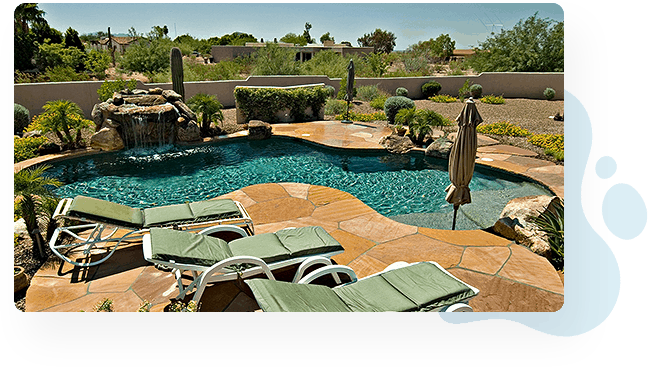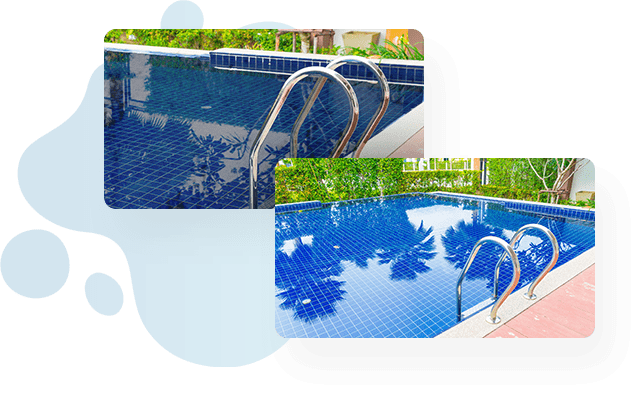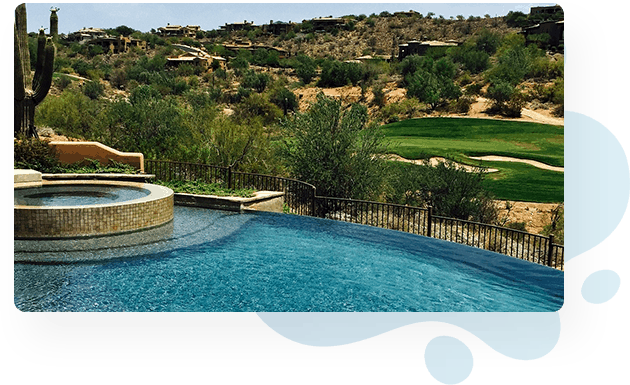Division of E&E Pools. Licensed, Bonded, Insured. AZROC# 309416 K-05 Dual License
Pool Resurfacing
Fountain Hills ARIZONA
We Also Serve:
As pool owners in Fountain Hills, Arizona...
We all know that a pool is more than a cool water getaway during a hot & sunny summer day. Your pool is where you unwind after a hectic week at work. It’s where your kids build lasting memories in the house they grew up in. It’s where the family comes together to simply have fun. Our company, E&E Pools is here to help get you back where you belong anywhere in the valley, our business will provide you with the commercial type quality that keeps our customers happy for life.
If your pool is showing signs of decay or neglect, let us help restore it to the beautiful family centerpiece it’s meant to be. Your pool renovation might be exactly what you need in order to get swimming right away, and we are the company to help you get back in the water.

As the leading pool service company in , AZ, we offer a variety of pool services that cover any solution you might
need, from resurfacing and individual repairs, down to routine cleaning and maintenance. From pool repair to pool
renovation, we have you covered. Even if you just need some work your pool deck we have you covered!
Our Pool Services In
Pool Resurfacing
Pool Repair
Pool Decks
Pool Tile
Pool Remodeling
Pool Step Stones
If you are in the area, and have any questions, please call us today to speak with an expert for an in-depth
consultation or quote and get back to enjoying yourself in summer.
What Is
Pool Resurfacing?

So what exactly is swimming pool resurfacing and what is the pool re-plastering procedure like? Well, if your present swimming pool is an in ground concrete pool that is covered with plaster, pebble, fiberglass or even all tile, the new surface can not simply discuss the existing surface. The existing surface requires to be prepared for a brand-new coat of plaster or pebble by first either cracking out the existing plaster, sand blasting and bond covering the surface area or hydro blasting the existing surface.
Per the National Plasterers Council, these are all appropriate approaches, however each comes with particular advantages or disadvantages. After the surface area has actually been correctly prepared, you are now prepared to apply the surface coat products of either plaster, quartz, exposed pebble, glass beads, or polished swimming pool finish.
Do You Need
A Pool Resurfacing?
Living under the sun can be hard on your pool. If your pool or spa is showing its age, it may be time to consider pool resurfacing and possibly an upgrade of your equipment. Your pool may have cracks, blisters, or discolorations that a resurface will eliminate. Depending on how your pool is currently surfaced and what you want to put on it, this could be a simple or difficult DIY project. Here are a few things to consider when deciding whether to resurface your pool yourself.
Topcoat Materials
If you have a gunite pool, your pool shell will be made of concrete that is 8-12 inches thick. A final finish will have been applied to the surface of the gunite. Typical finishes used are plaster, tile, Diamond Brite, or Pebbletek. This topcoat generally lasts up to 15 years. When you resurface your pool, it is this topcoat that is replaced.
Basic Process for Pool Resurfacing
While these steps won’t give you all of the information you need to completely resurface your pool, they make up a basic outline so that you can consider whether you will be able to do this work yourself and what you should prepare for.
Disclaimer: Before beginning the process, you must contact your city’s planning department to see if you need a permit to resurface your pool or if there are any other special requirements, like where to drain the water.

When resurfacing, you must first drain the pool.
Next, you should thoroughly clean the pool’s surface with a wire brush. If you have plaster on gunite, you will have to use a chisel, pick, or jack hammer to remove the plaster from the gunite shell. Once you have removed all the plaster, use a wire brush on the shell to remove all of the chalky material on the shell.
The surface should then be cleaned with trisodium phosphate (TSP) and followed by a coating with muriatic acid to remove mineral deposits. Be extremely careful when working with this acid, as it can damage your skin and lungs if inhaled directly. Always wear proper safety gear like gloves, boots, eye goggles, and sometimes a respirator. Finish by neutralizing the acid with TSP.

Once your pool’s surface is clean, the pool can be resurfaced by spreading plaster. For a pool with 100 linear feet, it will take around 2,500 pounds of plaster and 3,500 pounds of white-marble plaster sand to resurface the pool.
The Most Common
Pool Surface Types
The three most commonly used pool surfaces in are plaster, pebble, and quartz.
Plaster
Generally, new gunite pools are coated with pool plaster, which is cement mixed with marble sand or limestone. It is the least-expensive option for pool surfacing and typically lasts around 7 years.
Pebble
Pebble finishes as a pool surface are actually just plaster with aggregate mixed in. The addition of aggregate makes these more durable and white stain-resistant than plaster alone. Pebble finishes can be somewhat rough and cost twice as much as plaster, but the upside is that they often last over 12 years.
Quartz
A quartz finished pool surface has plaster with quartz aggregate mixed in. This provides more color than pebbles and is a more stain-resistant option for your pool. A quartz finish will usually lasts 12-15 years.
Fiberglass
A Fiberglass pool should be resurfaced with fiberglass. Look for special kits that use a white fiberglass resin and a
gel-coat to restore the finish to your fiberglass pool. We never recommend to replace this yourself.
Should You Resurface
Your Pool Yourself?
Pool plastering the interior surface of your pool should be left to the resurfacing experts who are professionals.
Getting your pool deck, waterline and tiles looking as white as possible. The main drawback to making this a DIY project is that water is not forgiving. If you make a mistake, you will be left with a leaking pool and will have to repeat the entire process. Plus, a medium-sized home pool will generally take two people over 20 hours to resurface. If you have a larger pool, it will often take three or four people to keep the plaster from setting too quickly. If this doesn’t appeal to you, consider hiring a professional to do the job.
However, resurfacing your pool yourself can be a rewarding task that could save you money. If you’re excited about resurfacing your pool and you’re willing to put in a bit of work, there’s nothing that should stop you.

Customer Service
As the leading pool services company in Fountain Hills, Arizona, we offer a variety of pool services that cover any solution you might need, from resurfacing and individual repairs, down to routine cleaning and maintenance. Call us today to speak with an
expert for an in-depth consultation and get back to enjoying yourself!
Our team and company is headquartered in Phoenix Arizona but can service & other outlying areas with our experts ready to work on your pool resurfacing at any time. Call us now to schedule an appointment with one of our experts and we’ll offer you a quote.
Give us a call today for an in-depth consultation with one of our experts. We can help guide you through the process of choosing the most appropriate service for your needs, saving you time and money!
Remember, if you want your project done right, trust local professionals that you can continually count on.
24871 South Ellsworth Road Suit 100 Queen Creek AZ 85142
M-F 8:00am - 5:00pm
Copyright © 2020. All rights reserved.
Privacy Policy | Sitemap

